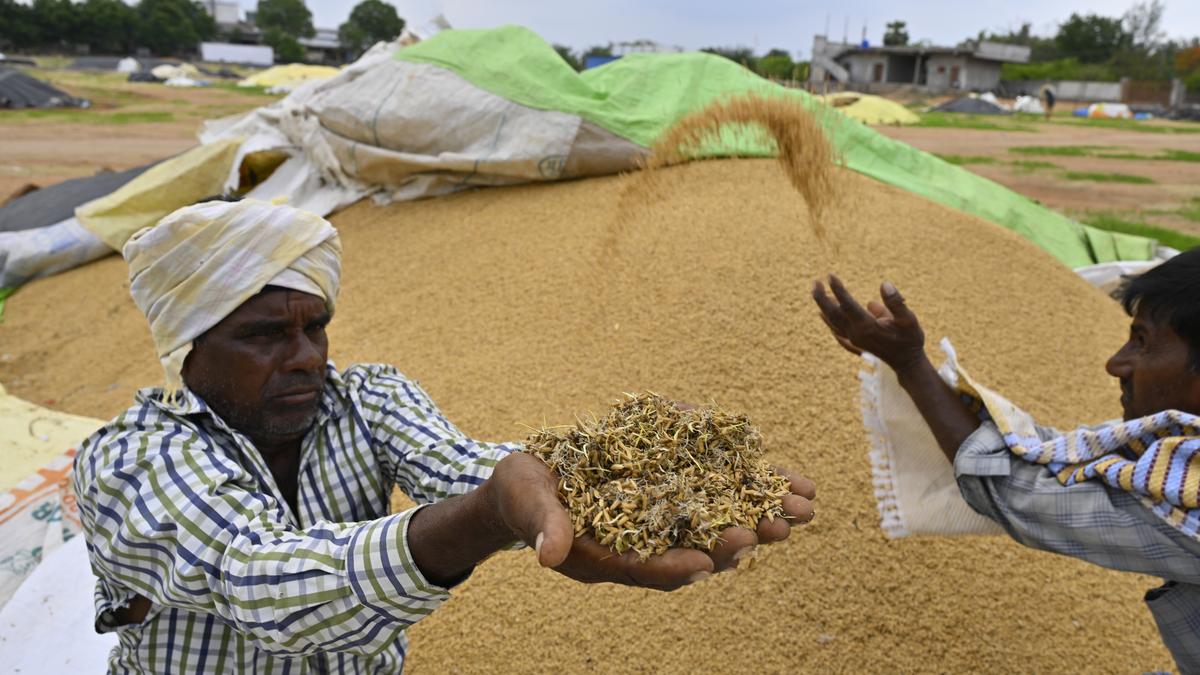
Unending woes of Telangana’s farmers Premium
The Hindu
Telangana farmer dies waiting to sell paddy, highlighting challenges faced by farmers in procurement and support systems.
Exactly a month ago, Telangana farmer Itharaveni Rajesham succumbed to heat stroke while perched atop a small heap of 38 quintals of paddy, waiting for his turn to sell it at a government-run procurement centre in Ragampeta village, 28 km from the Karimnagar district headquarters.
The 48-year-old had been guarding the paddy harvested from his 2-acre farm for over a week before the heat wave claimed his life. Temperatures rising to 45° Celsius have been sweeping through Choppadandi mandal and other parts of Karimnagar district over the past few weeks. On that afternoon, Rajesham left home on his moped and travelled half a kilometre to reach the procurement centre on the village outskirts.
Unaware of a piece of happy news awaiting him during his uncertain wait to sell his farm produce — his daughter clearing SSC exams, the results of which were announced after he had left for the procurement centre — the farmer met a tragic end. His death left his family — wife Malleshwari, son Raju, a first-year B.Tech student, and daughter Sravanthi — in shock.
“My father wanted me to become an engineer and my sister a nurse to serve society and bring fame to the village,” says Raju, tears rolling down his cheeks. “He toiled hard in the fields to carve out a good future for us in the face of financial difficulties. He used to work as a hamali (porter) in the lean season to supplement our family income,” he adds.
A relative recalls noticing Rajesham lying unconscious on the heap of paddy stock. Some at the procurement centre performed cardiopulmonary resuscitation (CPR) to revive him, but in vain. He was rushed to a local hospital, where he was declared ‘dead on arrival’.
The farmer was worried over the relatively low paddy yield this Yasangi/ Rabi season due to the scarcity of water for irrigation. “He was visibly exhausted, shuttling between his house and the procurement centre to sell his paddy for more than a week,” says Lingaiah, another relative, adding that Rajesham was struggling to surmount the crop losses incurred due to unseasonal rains over the past few years. Within a few days of Rajesham’s death, his entire common variety paddy produce was procured at the minimum support price (MSP) of ₹2,183 per quintal.
The bereaved family received ₹5 lakh claim amount under Rythu Bima, the State government’s life insurance scheme for farmers. However, the Rabi season instalment of Rythu Bharosa (previously known as Rythu Bandhu), an investment support incentive, is yet to be disbursed to the deceased farmer’s family, say official sources. Officials of the Revenue department have also sent a proposal to the government for sanctioning ₹5 lakh compensation to the family.

“Writing, in general, is a very solitary process,” says Yauvanika Chopra, Associate Director at The New India Foundation (NIF), which, earlier this year, announced the 12th edition of its NIF Book Fellowships for research and scholarship about Indian history after Independence. While authors, in general, are built for it, it can still get very lonely, says Chopra, pointing out that the fellowship’s community support is as valuable as the monetary benefits it offers. “There is a solid community of NIF fellows, trustees, language experts, jury members, all of whom are incredibly competent,” she says. “They really help make authors feel supported from manuscript to publication, so you never feel like you’re struggling through isolation.”

Several principals of government and private schools in Delhi on Tuesday said the Directorate of Education (DoE) circular from a day earlier, directing schools to conduct classes in ‘hybrid’ mode, had caused confusion regarding day-to-day operations as they did not know how many students would return to school from Wednesday and how would teachers instruct in two modes — online and in person — at once. The DoE circular on Monday had also stated that the option to “exercise online mode of education, wherever available, shall vest with the students and their guardians”. Several schoolteachers also expressed confusion regarding the DoE order. A government schoolteacher said he was unsure of how to cope with the resumption of physical classes, given that the order directing government offices to ensure that 50% of the employees work from home is still in place. On Monday, the Commission for Air Quality Management in the National Capital Region and Adjoining Areas (CAQM) had, on the orders of the Supreme Court, directed schools in Delhi-NCR to shift classes to the hybrid mode, following which the DoE had issued the circular. The court had urged the Centre’s pollution watchdog to consider restarting physical classes due to many students missing out on the mid-day meals and lacking the necessary means to attend classes online. The CAQM had, on November 20, asked schools in Delhi-NCR to shift to the online mode of teaching.









